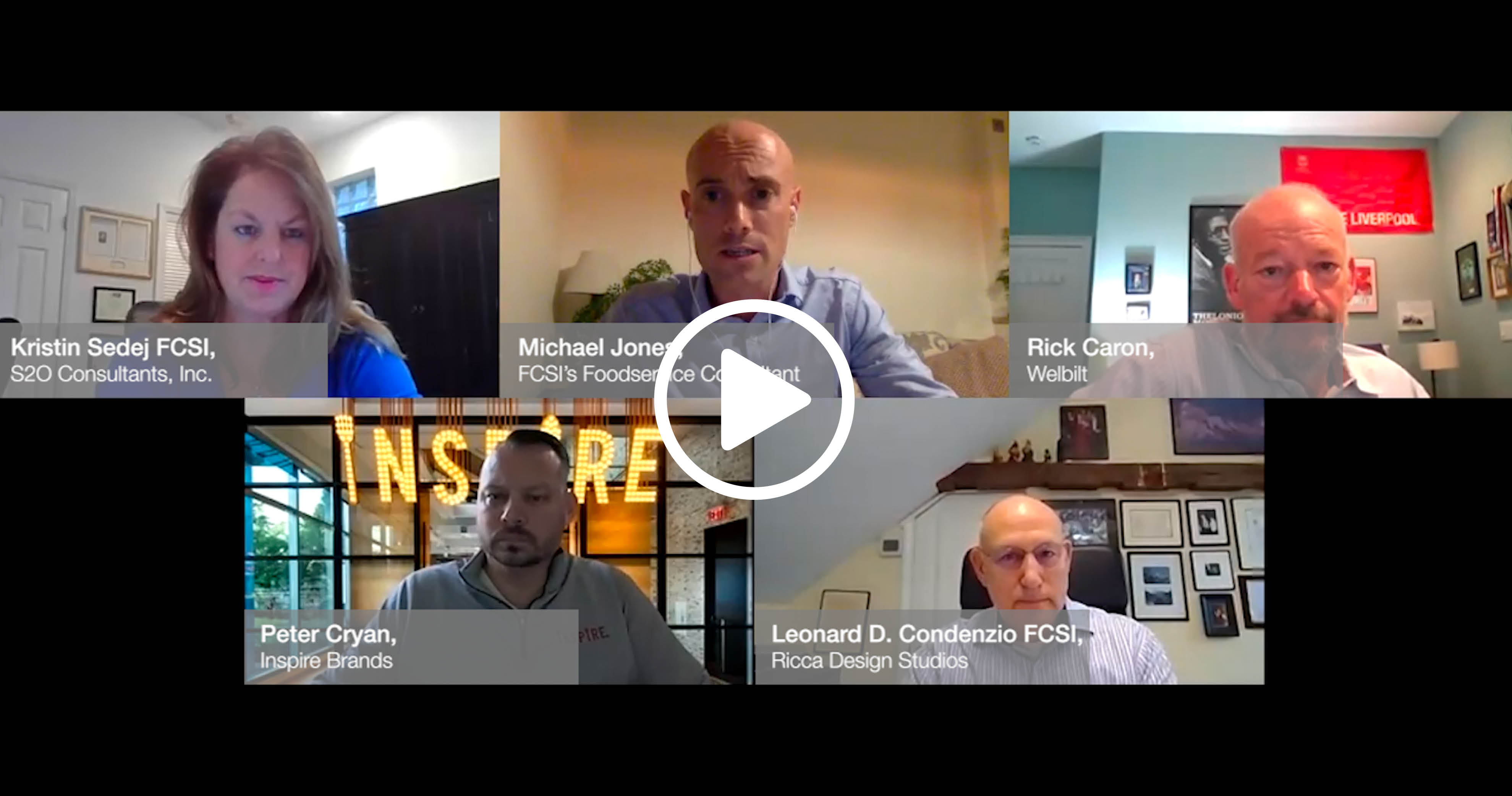On Friday December 11, 2020, two leading FCSI The Americas design consultants, Peter Cryan, sr. director of equipment innovation and R&D restaurant ops innovation at Inspire Brands and Rick Caron, executive vice president & chief innovation officer of Welbilt, Inc., met for a virtual roundtable to discuss how new technology and pioneering equipment is helping operators to diversify and free up space in foodservice settings, plus how consultants can maximize the potential of that innovation for their clients’ benefits.
Chaired by Michael Jones of FCSI’s Foodservice Consultant magazine, the panel saw experienced designers Kristin Sedej FCSI, president of S2O Consultants, Inc. and Leonard D. Condenzio FCSI, CEO of Ricca Design Studios, discuss how pioneering operators, such as Inspire Brands, are creating new F&B opportunities through investing in innovative back-of-house equipment and how changes in technology are helping to deliver products that drive better solutions for customers.
The roundtable, sponsored by Welbilt Inc., also looked at the consultants’ role in that process and how new design layouts are helping operators to diversity their offering – facilitated by improved technology – during the Covid-19 pandemic. The discussion took in topics as diverse as flexible food applications and hot holding processes, artificial intelligence, robotics and automation, blockchain, augmented reality, contactless and Just Walk Out technology (JWO).
You can watch the video of the roundtable below:
Skate close to the hockey puck
Predicting the future is, of course, never easy to do, but those consultants who stay close to their operator clients, and indeed the manufacturing community that supply equipment for them, will ensure they remain close to the cutting edge. “I think the key message is for the consultants to skate where the hockey puck is going to be,” says Welbilt’s Rick Caron.
“Some of these projects don’t come to fruition for two to three years and when they do, they’re going to be using equipment that’s more relevant in that time frame. So, in understanding the product time-frame, road maps and strategies when designing a project for 2025, we should be using equipment that will be relevant in 2025, not what’s out there today.”
According to Kristin Sedej FCSI, there are “universal issues” that need to be solved by the consultancy community – and the supporting experts around them in the industry. “We have labor issues, food quality issues, thru-put issues… That, by the very nature of itself is where technology starts to come in and be helpful. Our job is to explain how this is applicable to [clients], why it will be beneficial, why it might be cost productive and then see if we can convince them to do it. But also to listen,” she says.
As operators have sought smart ways to diversify their offering during the pandemic, for many companies there can still be an efficiency disconnect across the foodservice operation. Lenny Condenzio FCSI believes that front-of-house innovation has been accelerated by the Covid crisis and that this, in turn, is now forcing a slower to react back-of-house to catch up. “That challenge is with us consultants to say ‘how is the back of house providing that efficiency that is required to go with the front of house?’,” says Condenzio.
One operator that has seen numerous brands within its porfolio find clever ways to adapt during these challenging times is Cryan’s company Inspire Brands, which this week fully acquired Dunkin’ Brands in a deal valued at $11.3 billion. But, Cryan agrees with Condenzio that back of the house, despite making significant advances in areas such as hot-holding technology, still needs to find ways to adapt to the vast plethora of technology available that can help alleviate many of the issues the panel discussed.
“I think the restaurant industry is way behind in automation,” says Cryan. “It’s way behind in the Internet of Things (IoT). We need to continue to do more of that. That’s a big opportunity, because it helps with efficiency and thru-put and some staffing opportunities.”
Further details:
To find out more about our sponsor Welbilt, Inc., please visit here.

